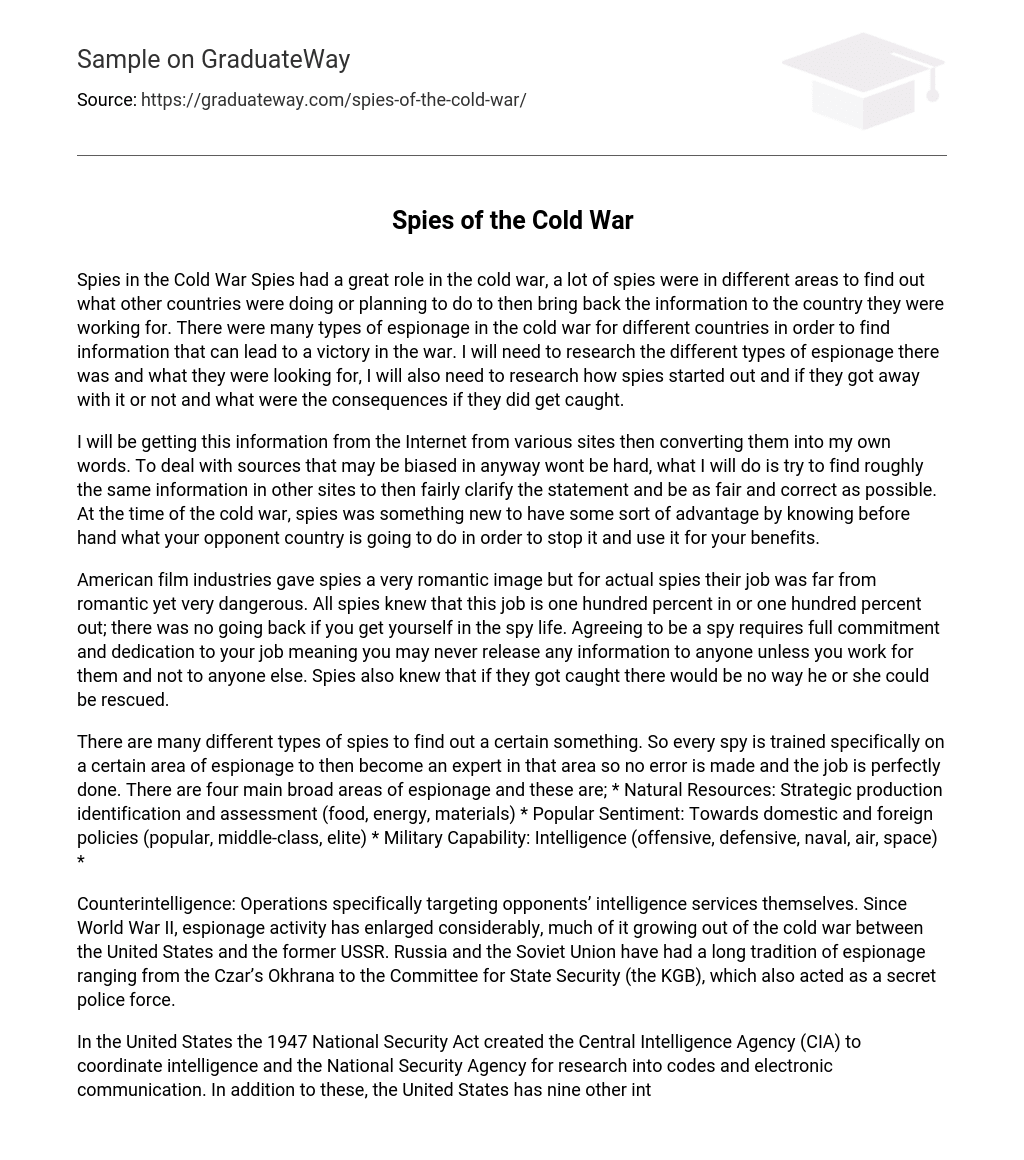Spies in the Cold War Spies had a great role in the cold war, a lot of spies were in different areas to find out what other countries were doing or planning to do to then bring back the information to the country they were working for. There were many types of espionage in the cold war for different countries in order to find information that can lead to a victory in the war. I will need to research the different types of espionage there was and what they were looking for, I will also need to research how spies started out and if they got away with it or not and what were the consequences if they did get caught.
I will be getting this information from the Internet from various sites then converting them into my own words. To deal with sources that may be biased in anyway wont be hard, what I will do is try to find roughly the same information in other sites to then fairly clarify the statement and be as fair and correct as possible. At the time of the cold war, spies was something new to have some sort of advantage by knowing before hand what your opponent country is going to do in order to stop it and use it for your benefits.
American film industries gave spies a very romantic image but for actual spies their job was far from romantic yet very dangerous. All spies knew that this job is one hundred percent in or one hundred percent out; there was no going back if you get yourself in the spy life. Agreeing to be a spy requires full commitment and dedication to your job meaning you may never release any information to anyone unless you work for them and not to anyone else. Spies also knew that if they got caught there would be no way he or she could be rescued.
There are many different types of spies to find out a certain something. So every spy is trained specifically on a certain area of espionage to then become an expert in that area so no error is made and the job is perfectly done. There are four main broad areas of espionage and these are; * Natural Resources: Strategic production identification and assessment (food, energy, materials) * Popular Sentiment: Towards domestic and foreign policies (popular, middle-class, elite) * Military Capability: Intelligence (offensive, defensive, naval, air, space) *
Counterintelligence: Operations specifically targeting opponents’ intelligence services themselves. Since World War II, espionage activity has enlarged considerably, much of it growing out of the cold war between the United States and the former USSR. Russia and the Soviet Union have had a long tradition of espionage ranging from the Czar’s Okhrana to the Committee for State Security (the KGB), which also acted as a secret police force.
In the United States the 1947 National Security Act created the Central Intelligence Agency (CIA) to coordinate intelligence and the National Security Agency for research into codes and electronic communication. In addition to these, the United States has nine other intelligence gathering agencies to which the old adage ‘too many cooks spoil the broth’ appears to apply equally well to espionage. Famous cold war espionage cases include Alger Hiss and Whittaker Chambers and the Rosenberg Case.
In 1952 the Communist Chinese captured two CIA agents, and in 1960 Francis Gary Powers, flying a U-2 reconnaissance mission over the Soviet Union for the CIA, was shot down and captured. During the cold war, many Soviet intelligence officials defected to the West, including Gen. Walter Krivitsky, Victor Kravchenko, Vladimir Petrov, Peter Deriabin Pawel Monat, and Oleg Penkovsky, of the GRU (Soviet military intelligence). Among Western officials who defected to the Soviet Union are Guy F. Burgess and Donald D.
Maclean of Great Britain in 1951, Otto John of West Germany in 1954, William H. Martin and Bernon F. Mitchell, U. S. cryptographers, in 1960, and Harold (Kim) Philby of Great Britain in 1962. U. S. acknowledgment of its U-2 flights and the exchange of Francis Gary Powers for Rudolf Abel in 1962 implied the legitimacy of some espionage as an arm of foreign policy. So basically spies had a great role in the cold war. Many spies were caught during the cold war trying to sell information to other countries or by simply getting caught being a spy from a certain country spying in a country.
But today I am sure there are still spies all around the world, security is much more powerful these days but spies are very sneaky and sly and get away with by faking diplomacy to have access to private information that can cause serious issues if the wrong person has this information. I think generally spies were successful in the cold war, many spies collected very good information in order to win the battle between countries, although many got caught, I still think that spies in the cold war did a good job with a very big risk of getting caught.
Sources: http://en. wikipedia. org/wiki/History_of_Soviet_and_Russian_espionage_in_the_United_States http://en. wikipedia. org/wiki/Category:Cold_War_spies http://www. historylearningsite. co. uk/spies_cold_war. htm https://www. cia. gov/library/center-for-the-study-of-intelligence/csi-publications/csi-studies/studies/vol51no2/intelligence-in-recent-public-literature. html http://www. slideshare. net/jtrip/cold-war-spies http://news. bbc. co. uk/2/hi/europe/8184338. stm





